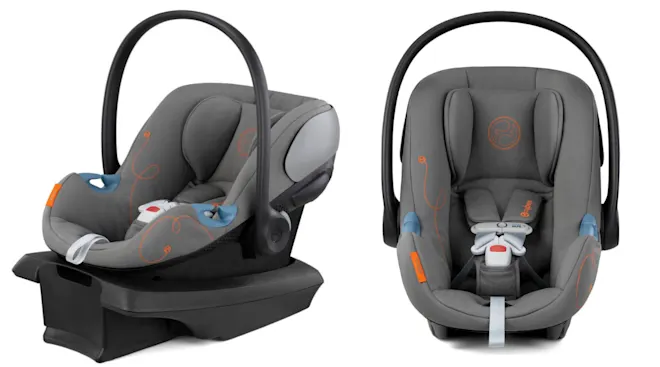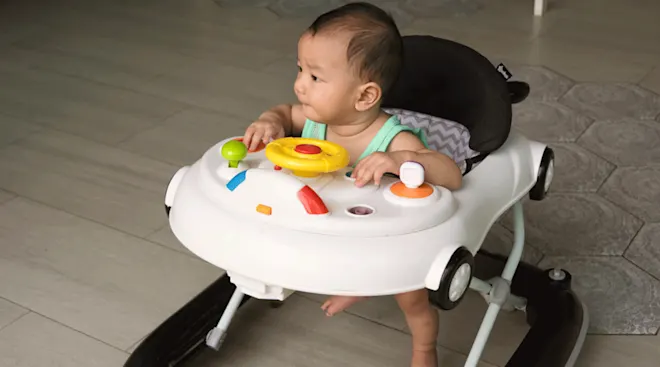When Can Newborns Go Outside?
It’s super-rewarding to experience new things with baby, and going outside together is no exception. Of course, picking that first pumpkin at the patch or heading to the playground sprinklers might seem far in the future when you’ve got a shiny newborn to keep you company—but there are plenty of ways to enjoy the great outdoors together right from the start. Wondering when newborns can go outside? Here, we’ll give you the scoop on exactly how to get baby out and about safely and happily—and when it’s okay to do so.
If you’ve just given birth and are yearning for some fresh air, you may be itching to ask: “When can I take my newborn outside?” We’ve got good news for you: It’s okay to take baby outside right from birth (but you may want to be mindful of any extreme weather conditions, like if it’s too hot or too cold). Laura Purdy, MD, MBA, a hospitalist at Williamson Medical Center and Chief Medical Officer at OpenLoop, says you can and should do it whenever you feel ready. “As long as your baby is healthy and the pediatrician did not share any cautions with you that would prevent the baby from going outside, it’s safe anytime!” she adds.
If the prospect of heading outside with your newborn feels daunting, start with a leisurely walk. You can use the stroller or wear baby in a carrier. Going for a stroll or having your next feeding session on a park bench is a great bonding experience and a nifty way for you to get some fresh air and vitamin D.
When can a newborn go outside in public?
As for taking baby out to public places, it’s recommended that you avoid bringing them into congested spaces, if possible—at least until they’ve had their first round of vaccinations. “Infants under a few months old don’t have their first immunizations (to protect against whooping cough, polio, pneumococcal diseases, etc.) and their immune systems are immature, so it’s important to avoid crowded areas,” says Meghan Martin, MD, a pediatric emergency medicine doctor at Johns Hopkins All Children’s Hospital in St. Petersburg, Florida. Because newborns haven’t developed great immunity, they’re already at a higher risk for infections. Due to this, most pediatricians recommend waiting six to eight weeks before taking baby into crowded areas, like stores, restaurants and on public transit. That said, sometimes taking a newborn out before 6 weeks of age isn’t a matter of choice—it’s a necessity. In these situations, speak with your pediatrician and take the necessary steps to keep your little one healthy and happy (more on that below).
Purdy notes that your doctor may advise against taking baby out in public if they have a further compromised immune system, due to a severe illness, such as cancer, or chronic conditions like Type 1 diabetes or cystic fibrosis. “Babies that are born very prematurely or have a lengthy NICU stay could be recommended to hold off from public appearances while they’re growing and developing their immune systems,” she adds.
Use some common sense and follow your instinct when taking your newborn outside. If it’s too hot or too cold, go back indoors. Regardless of whether you’re just doing some laps in the neighborhood or heading into town, there are a few tips you should keep top of mind to make those first outings pleasant and safe:
- Keep baby out of direct sunlight. Put a wide-brimmed hat on baby and bring a light blanket to help shade them from the sun. Babies 6 months and older can use sunscreen.
- Dress baby appropriately. In warm weather, dress your little one in loose, comfortable clothing. In colder temps, consider a fleece-footed sleeper to avoid exposing baby’s skin to cold and wind. If it’s particularly nippy, a baby carrier can offer added warmth.
- Avoid insects and mosquitoes. Martin notes that babies 2 months and older can use 10 to 30 percent DEET insect repellent. However, the American Academy of Pediatrics notes you’ll want to do so sparingly, as their skin can be different than that of older children and adults. Speak with your pediatrician to weigh the risks and benefits of using insect repellents on babies and toddlers, and, in the meantime, avoid woodsy areas or other insect-prone spaces.
- Monitor baby closely. Babies can’t regulate their temperature like adults and older children can, so it’s important to watch for signs of overheating (or alternatively, of being too cold), says Martin. If they’re flushed and irritated, they may be too hot, says Martin. If baby is shivering or has cold hands and feet and pale skin, time to warm up inside!
- Be conscious of germs. If you’re out in public, maintain social distance and try not to let people to get too close or touch baby. A baby carrier can keep your newborn nestled on your chest and deter curious strangers from getting handsy (win-win!). While you’re being germ-cautious, she recommends washing your hands frequently—and wiping down baby’s hands too!
- Pack the essentials. If you’re running an errand with baby in tow, make sure you have the basics packed—diapers, wipes and a spare change of clothes will regularly come in handy.
- Don’t hang bags from the stroller’s handles. Going for a stroll with your newbie? Martin warns that adding too much weight to the handles of your stroller can cause it to tip, creating a potentially dangerous situation for baby.
There’s nothing quite like getting outside with your new little one. After all, there’s so much to see and explore! But there are certain times when venturing out is not advisable. Martin recommends avoiding trips in these circumstances:
- When there’s severe weather or the threat of severe weather
- On very hot days when the UV index is at the highest point of the day (between 10 a.m. and 4 p.m.)
- When you know you’ll be outside for extended periods of time
- Martin also says to “use caution” if baby is sick
If baby has an underlying condition that compromises their immune system, talk to your pediatrician about the types of outdoor activities and errands you should and shouldn’t be doing together.
Taking your newborn on outings can be exciting (and daunting!), but a change of scenery can be good for both of you. Take it one step—and one outing—at a time. Soon, you and your little companion will be ready to go all sorts of places together.
Please note: The Bump and the materials and information it contains are not intended to, and do not constitute, medical or other health advice or diagnosis and should not be used as such. You should always consult with a qualified physician or health professional about your specific circumstances.
Plus, more from The Bump:
Meghan Martin, MD, is a pediatric emergency medicine attending physician at Johns Hopkins All Children's Hospital in St. Petersburg, Florida. She earned her medical degree from Florida State University in Tallahassee, Florida.
Laura Purdy, MD, MBA, is a hospitalist at Williamson Medical Center and chief medical officer at OpenLoop. She earned her medical degree from Uniformed Services University of the Health Sciences in Bethesda, Maryland.
American Academy of Pediatrics, Choosing an Insect Repellent for Your Child, April 2023
Learn how we ensure the accuracy of our content through our editorial and medical review process.
Navigate forward to interact with the calendar and select a date. Press the question mark key to get the keyboard shortcuts for changing dates.




















































